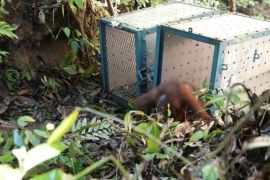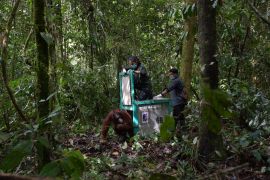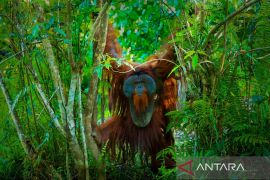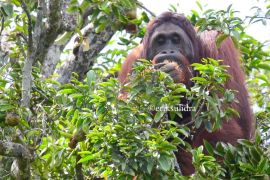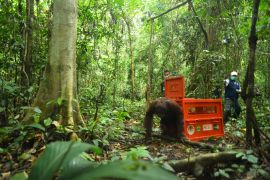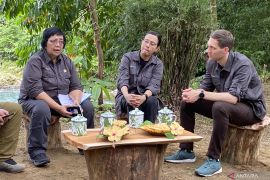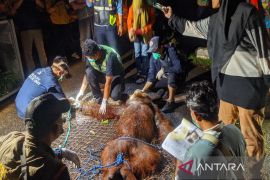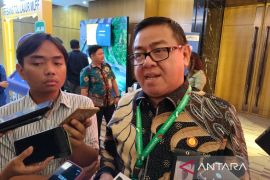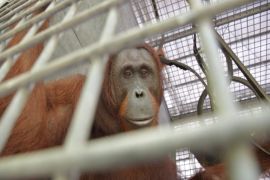The smaller the size, the more expensive they are at a price range of Rp500,000 to Rp2.5 million (approximately 56-278 US dollars) each, according to Center for Orangutan Protection (COP) principal Hardi Baktiantoro to ANTARA (Feb 18).
Due to the dismaying reality, Baktiantoro said orangutan`s rehabilitation is being threatened with a total failure should Forestry Ministry does not secure the forest where ex-rehabilitated orangutans repatriated eventually. COP urges the government to turn this area into vital object.
He went on to say that should the government fail to take a serious attention, then the orangutan rehabilitation project would be of no meaning. "It would be most ridiculous if just moments after being released, the orangutans are captured back by poachers to be sold to those who would buy them."
Bhaktiantoro added that Forestry Ministry should have assigned forestry rangers to watch the release areas around the forest of Muara Wahau, East Kalimantan from encroachment from illegal loggers and poachers.
He said that more orangutans will be released into the forest after years of being trained in the rehabilitation center managed by Borneo Orangutan Survival Foundation (BOSF), a non-profit organization established in 1991, which focuses on preparing orangutans to be reintroduced to their natural environment at its rehabilitation centers.
"Orangutan`s repatriation is by no means free, as the forest where they will be repatriated into eventually, has been considered as a commercial zone - as that applied to other forests dedicated for logging concessions," he added.
BOSF was required to pay for 1.5 million US dollars to secure a forest concession permit for an orangutan release site in the area. However the incredibly high price still excludes guarantees of security for the forest and all of its biodiversity living inside it.
According to him, the government`s lack of contribution to secure the forest will serve as a policy to send the big apes into a killing zone. Muara Wahau is a forest zone with massive forestry crimes, one of which is a forest clearing done to build a line of railway, for coal transportation.
The bad has gone worse since many speculators cleared the forest along the both side by the railway`s lines and claimed the logged forest as their own property. Illegal logging, both done by local people or companies, keeps ongoing within the forest.
In addition to poaching and illegal logging, palm oil corporations have become one of the biggest threats for the forest in Muara Wahau as well, as they have been deforesting the area for palm oil plantations - and this has eased poachers to catch wild animals, which has no more homes to hide.
Many of them fled into fragmented forests within the palm oil plantations. They are trapped and caught, or even killed, by poachers in the small pockets of degraded forest, which are claimed as conservation forests by the palm oil corporations.
Abnormal Behavior
COP has previously assessed and monitored ex-situ conservation institutions, particularly zoos in Java, where orangutans had been kept as show animals, during the last twenty-three months - from April 2009 to February 2011.
Outputs gained from the assessment have served as inputs for administrators of ex situ conservation bodies for improved treatments, which meet the animal welfare requirements, for captive orangutans. During the assessment and monitoring activities COP found important findings.
The assessments were carried out at five biggest zoos in Indonesia, Surabaya Zoo, Taru Jurug in Solo, Gembiraloka (Yogyakarta), Tamansari (Semarang) and Ragunan (Jakarta). The assessments indicated that captive orangutans in those zoos had shown abnormal behavior due to poor facilities and treatment, from either the zoo`s administrators or visitors.
The research was extended to other conservation institutions, including Batu Secret (Malang, East Java), Maharani (Lamongan, East Java), Rominsi Recreational Park (Kartasura, Central Java), Wersut Seguni Recreational Park (Kendal, Central Java), Taman Safari (Bogor, West Java), Prigen and Pasuruan (East Java).
The research`s outcome has proved that zoos with more expansive tickets of admittance, such as Taman Safari - both located in Bogor and Prigen, Batu Secret Zoo and Maharani Zoo, have more well-provided orangutans, according to COP.
However orangutans exploitation, in a form of orangutan-visitor?s photo sessions, within those zoos still happen - and such practice have been observed to leave the orangutans in suffering and by no means provide visitors with educating values about what conserving wild animals is.
More Releases
Beginning in 2010 onward, orangutans may get a better future as the government has committed to giving more attention hopefully can be translated as more releases into the wild. Conservationists had been unable to release any orangutans since 2002 due to the difficulty in finding suitable habitats though 450 were released between 1992 and 2002 in East Kalimantan.
Visiting orangutan rehabilitation center at Nyaru Menteng, Central Kalimantan in September 2010, Forestry Minister Zulkifli Hasan had vowed to speed up issuing permits for their releases.
"The longer they were kept in cages, the harder it would be for them to adapt to their natural habitat," Minister Hasan said when inspecting the cages of orangutans at the center which managed by BOSF which handles 611 orangutans with 141 are ready for release into the wild while efforts on finding a suitable habitat for them are being carried out until now.
In 2010 Forestry Ministry had issued the final permit for an Ecosystem Restoration Concession (ERC) to PT Restorasi Habitat Orangutan Indonesia (PT RHOI), paving the way for the eventual more release of rehabilitated ex-captive orangutans into protected areas in East Kalimantan.
RHOI is a company established by BOSF for obtaining ex-logging forest concessions for ecosystem restoration. The newly acquired area is a 86,450 hectare former logging concession in Kutai Kartenegara district and Kutai Timur district, East Kalimantan.
The concession covers 86,540 hectares of previously logged land for which RHOI must pay a license fee of Rp13 billion (1.4 million US dollar) over the next 60 years. (*)
Reporter: By Vicki Febrianto
Editor: Kunto Wibisono
Copyright © ANTARA 2011
